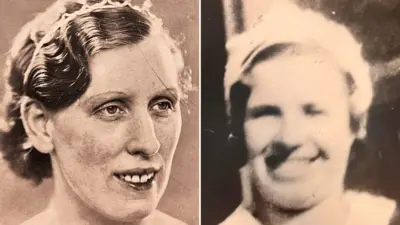We've updated our Privacy and Cookies Policy
We've made some important changes to our Privacy and Cookies Policy and we want you to know what this means for you and your data.
'Being fat at four means a life of ill-health'
- Author, Jane Elliott
- Role, Health reporter, ┤¾¤¾┤½├¢ News
Children who are overweight at the age of four face a lifetime of ill-health, according to a leading expert.
Dr David Haslam, a GP who chairs the National Obesity Forum, says that the age of four is a crucial point, because once a child starts school "the battle is lost".
Life patterns are already established and beginning school means the home stops being the sole place a child's diet is decided.
More than one in five children in England start their school life overweight or obese.
Some four-year-olds are so big now that, for the first time, Marks and Spencer has launched a range of out-sized schoolwear to cater for them.
Such overweight and obese children are left at increased risk of health problems such as type 2 diabetes, cancer, heart disease, joint and foot problems, as well as psychological problems.
'Missing a trick'
Dr Haslam, who is also a member of ESCO (Experts in Severe and Complex Obesity), a group set up to improve access and treatment for severe and complex obesity on the NHS, said giving midwives a more active role was vital.
He warns the NHS must go "back to the start of life" in order to prevent early childhood weight problems.
Pregnancy is the time to intervene, he says, by asking midwives to pass on healthy eating information to expectant mothers.
He feels that by not having midwives on board tackling obesity, the NHS is "missing a trick".
"When mums are pregnant there is no problem accessing 95% of them as they are in and out of the GPs' and midwives' office. But there is very little done on weight management.
"The life of an obese person starts well before birth, when mum gets pregnant. What I am suggesting is that midwifery practices be more lifestyle and obesity focused.
"By the age of four, if you haven't done anything to stop the problem then you have got trouble.
"This poor kid has done nothing, there is nothing he could have done. He has a future of obesity with no chance of having a fit and lean future."
He said prioritising breast feeding as vital was one key way of protecting against obesity and allergies. But he said some are still not heeding the advice.
"I see mums and say 'are you breast feeding?' and they say 'why should I be?' and I put my head in my hands, because once you have moved on you can't go back to it."
Long-term problems
The latest research seems to suggest that the rate of increase is levelling off, but experts say there are still considerable problems, with 1.5 million children who are overweight or obese in England alone.
Sue Jacob, from the Royal College of Midwives, said that if properly resourced her profession would welcome a bigger input.
"Women trust midwives and have a good relationship with them, but we need to be given space and resources to do this job.
"If we had the time and resources we could change attitudes."
Paul Sacher, research director at MEND, a programme which aims to encourage obese children to be more healthy, agreed a healthy start was vital.
"Children who are obese at a very young age are more likely to become obese adults. Being obese in early childhood is associated with a wide range of health problems from childhood to adulthood.
Dr Carel le Roux, a member of ESCO and lead clinician from the Imperial Weight Centre at Charing Cross Hospital said: "If a patient is overweight by the age of four that makes our life much harder to treat in the long-term."
He said that genetics did play a significant part in why someone might or might not become obese - obese women are more likely to have obese children - but he said genetics could not be blamed for everything.
"The genetics load the gun, but the environment pulls the trigger."
Top Stories
More to explore
Most read
Content is not available








